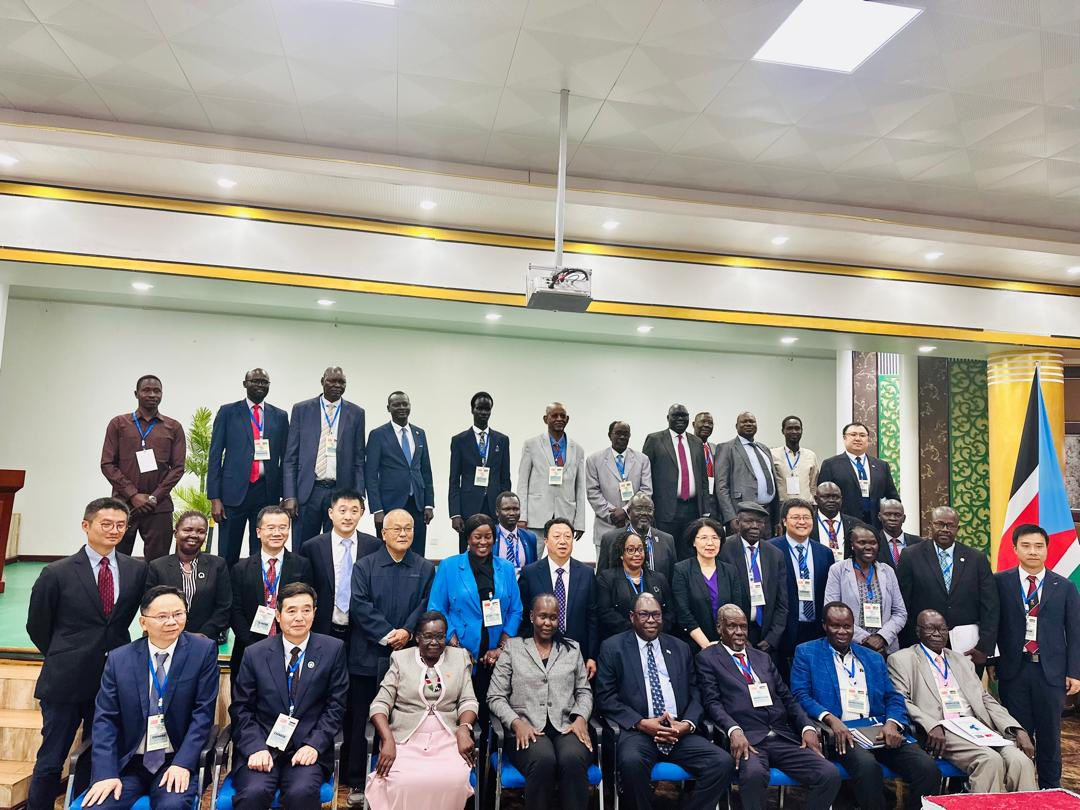China, South Sudan reaffirms partnership for peace, development in landmark symposium

Chinese Embassy in collaboration with the University of Juba held a high-level gathering of stakeholders to advance peace and development
By Aguok Chok
The University of Juba in collaboration with the Chinese Embassy in South Sudan on Monday held the China–South Sudan High-Level Symposium for Peace and Development.
The gathering brought together senior government officials, academics, and diplomats to reflect on how cooperation between the two nations can foster peace, stability, and prosperity.
Speaking at the event, the Vice Chancellor of the University of Juba, Prof. Robert Mayom, highlighted China’s consistent contribution in various fields, including infrastructure, education, and healthcare.
He noted that “this operation is driven by the belief that economic growth and the infrastructure department are the most effective means to end poverty.”
Prof. Mayom praised the role of Chinese aid in transforming lives, “We have also provided technical assistance, for instance, the supply of seeds for attention, machinery for attention, and with mankind.”
He further emphasized the value of Chinese-built facilities.
“In China, we have built for aid. We have built a hospital for ourselves. Of course, we have built clinics.”
The Vice Chancellor recognized the training and scholarship opportunities that are often offered by China to South Sudanese students.
“They have also trained our academics, at various levels, P and E level, the master’s degree level, and various universities in China,” he stated.
According to him, these investments in human capital have strengthened the foundation for long-term cooperation.
In conclusion, Prof. Mayom praised China’s policy of non-interference, saying this is characterized by China’s long-term policy on non-interaction in other people’s countries.
Meanwhile, the Minister of Cabinet Affairs, Martin Elia Lomuro, spoke on the central theme of peace as the foundation for development.
“For South Sudan, peace is not a lecture here. Peace is a necessary foundation for our initial state building and a lifeline,” he declared.
He reflected on South Sudan’s journey of conflict and the ongoing efforts to implement the Revitalized Peace Agreement.
“We know firsthand that without peace there can be no stability, no prosperity and no security for our people,” he explained. The minister emphasized that peace dividends must be visible in people’s daily lives.
“The citizens of South Sudan must see tangible improvements in their daily livelihood, schools for their children, hospitals for their families, roads and bridges to connect with their markets and the opportunity to work and thrive.”
Dr. Lomuro also recognized China’s practical support from roadmaps to hospitals, from scholarships to technology transfer.
He said China has been standing with the people of South Sudan in practical ways that impact the citizens’ lives.
The cabinet affairs minister stressed that peace and development are not the sole responsibility of the government.
“They are shared responsibilities, communities, privileges, leaders, women and youth, all have roles to play in reconciliation and reconstruction.”
As the country prepares for elections, he called for commitment to peace and unity. “This is a decisive moment for us, and the opportunity to transform peace from paper into practice and to convert development from promises into lived reality. Let us choose the path of peace. Let us commit to development that is inclusive, equitable, and sustainable.”
Mrs. Huo Ying, Charge d’Affaires of the Chinese Embassy in Juba, who delivered remarks on behalf of the Chinese Ambassador, underscored China’s global philosophy of peaceful development.
“Since the founding of the People’s Republic of China in 1949, China hasn’t provoked a single conflict or war. It is the only major country that has written peaceful developments into both institutions of the nation,” she said.
Ying reminded the audience of China’s historical opposition to colonialism and commitment to sovereignty.
“China supports South Sudan in pursuing the liberal lens, gives its national conditions, and supports Africans in seeking African solutions to African problems,” she stated.
“Without a peaceful and stable environment, development is out of question. Without development, peace cannot be easy,” she explained.
The diplomat called for tolerance and patience toward South Sudan as the world’s youngest nation.
She also outlined new opportunities under the China–Africa cooperation frameworks. “President Xi Jinping announced that China will implement zero-tariff treatment for 100.7 tariff lines for 53 African countries, including South Sudan, and provide more convenience for the least developed countries in Africa to export to China,” she revealed.
The Chinese diplomat highlighted the ongoing projects such as the Juba Teaching Hospital Phase Two, water supply initiatives, and digital technology cooperation.
“We will continue to play a constructive role within our capacity for South Sudan’s development and prosperity in the future,” she assured.
The symposium concluded with gratitude expressed to the organizers and renewed hope for strengthened relations.


